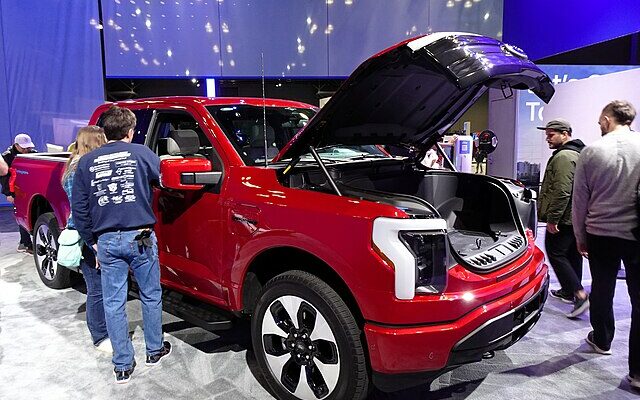
In another example of Democratic obsession with electric vehicles destroying the economy of Michigan, one of the most anticipated electric trucks has seen a halt in production.
Why? Because no one wants them.
Ford Motor Company’s announced decision to halt production of its electric F-150 Lightning pickup truck at its Dearborn, Michigan, plant underscored the problems facing automakers as they try to adhere to local mandates to rapidly implement electric vehicles. From November 18, 2023, to January 6, 2025, the production facility will be paused as Ford recalibrates its EV production strategy. This development reflects a broader struggle for legacy automakers who, pressured by federal EV mandates, must balance ambitious electrification goals with sluggish consumer demand for electric trucks.
Over 700 hourly workers at the Michigan plant will be placed on temporary layoff. Shawn Fain, the head of the UAW who has aggressively supported Kamala Harris and her push for EV mandates, has yet to release a statement.
Behold Bidenomics in action:
The Washington Free Beacon wrote that “Ford’s halt in F-150 Lightning production highlights the disastrous impact of federal EV mandates driven by the Biden-Harris administration,” Jason Isaac, the CEO of the American Energy Institute, told the Washington Free Beacon. “These mandates are destabilizing the global auto industry while paving the way for cheap Chinese imports to dominate.”
“American automakers and workers are paying the price for policies that ignore real consumer demand,” Isaac continued.
The announcement is a stunning blow to Ford’s ambitious plans to scale-up EV production and sales, and underscores the broader problems facing the EV industry. And it comes two months after Ford canceled plans to develop an all-electric three-row SUV due to slowing consumer demand and just days after Ford projected its EV business would lose $5 billion in 2024.
It is also a setback for the Biden-Harris administration and Democrats’ climate plans to rapidly saturate the market with EVs and phase out traditional gas-powered cars. In May 2021, President Joe Biden and Slotkin participated in Ford’s ceremony at the soon-to-be-idled plant in Dearborn to celebrate the rollout of the F-150 Lightning.
Early in his term, Joe Biden visited the plant, saying, “We’re at a great inflection point in American history. How we handle the next 4 to 10 years is going to determine where we’re going to be 30, 40, 50 years from now. It’s one of those moments in American history.
This is an incredible facility.
If we act to save the planet, we can create millions of good-paying jobs, generate significant economic growth and opportunity to raise the standard of living for people not only here, but around the world.”
Elissa Slotkin, the Democrat running for United States Senate in Michigan also joined Biden that day, remarking that “The development of mass market electric trucks is a huge milestone, and the President’s plan to invest in this new technology represents a once-in-a-generation moment to surge ahead of China when it comes to advanced manufacturing and addressing climate change. The current situation with electric vehicles — where China is ahead of us but we are poised to take the lead — reminds me of the space race with the Soviet Union: they may have gotten to space first, but we doubled down and were the first to put a man on the moon.”
Ford’s decision to pause production of the F-150 Lightning follows the company’s recent cancellation of plans for an all-electric, three-row SUV, citing insufficient consumer interest as a key factor. Financial forecasts have turned grim for Ford’s EV division, with anticipated losses of around $5 billion in 2024. This financial strain has led Ford to adopt a more cautious approach, as noted by a Ford spokesperson who highlighted the need for an “optimal mix of sales growth and profitability.” The company’s experience illustrates the difficult balancing act between responding to market demands and fulfilling regulatory commitments to EV production.
The discrepancy between policy goals and actual sales numbers has fueled political debate, especially as Michigan’s Senate race has heated up. Republican candidate Mike Rogers recently criticized the administration’s approach, arguing that current EV mandates disproportionately harm Michigan’s automotive workforce while benefiting foreign competitors. Rogers contends that while domestic companies struggle to meet mandated EV quotas, countries like China, where EV production costs are lower, are better positioned to benefit from increased EV demand.
[Read More: They’re Counting Illegal Votes In One Major Swing State]











